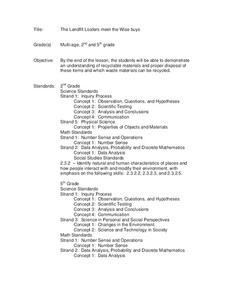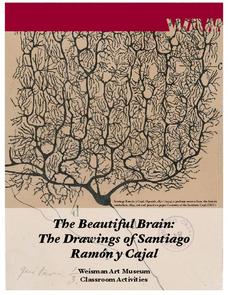Discovery Education
The Everyday Science of Sports
Physical science juniors will enjoy this sensational enrichment on aerodynamics, especially if they are also sports fans! With a focus on physical features and behaviors, collaborative groups make observations on five different golf...
Curated OER
Suited for Space
A fantastic instructional activity on survival in outer space should excite your learners! Pupils explore the challenges that living, working, and surviving in space elicit. They focus on the spacesuit itself; how it protects astronauts,...
National Library of Medicine
Your Environment, Your Health: Air Quality
Some scientists argue that air pollution now causes more deaths than smoking. The second unit in a six-part series focuses on air quality. Scholars learn what's in the air, how clean the air around their school is, and what they can do...
National Library of Medicine
Your Environment, Your Health: Runoff, Impervious Surfaces, and Smart Development
Can a sidewalk increase the amount of pollution in local streams? Scholars learn the answer to this question though research and experimentation in the fifth unit in the six-part series. Pupils study runoff, impervious surfaces, and the...
National Library of Medicine
Your Environment, Your Health: Food Safety
Did youknow that chicken causes the greatest risk of food-borne illness. The fourth unit in a six-part series addresses food safety. Scholars research common scenarios of food causing illness through the National Institute for Health....
NASA
Developing an Investigation
Watch as your class makes the transition from pupils to researchers! A well-designed lesson has scholars pick a solar wind characteristic to research. They then collect and analyze official data from the LANL website. This is the third...
Science 4 Inquiry
The Ins and Outs of Photosynthesis
The most important chemical process on Earth is photosynthesis. Scholars explore the changes in the gases in our atmosphere as life on Earth developed. They create a model of photosynthesis and consider simple questions.
Curated OER
The Landfill Loafers Meet the Wise Buys
Students discover recyclable materials and the proper disposal of those items through Internet research. Working in groups of four, they search the Internet for uses of recyclable materials. After research is complete, they participate...
Discovery Education
Jets in Flight
This Discovery Education activity provides the information needed to understand the basics of flight. Before taking off, young pilots learn the eight stages of the engineering design process. Small groups then design and build an...
Curated OER
Ecology
Learners explore, experience and experiment identifying the human impact on the environment of vegetative differences within the same biome. They assess what causes deserts, rain forests, savannahs, tundras and saguaros and how these...
University of Minnesota
Beautiful Brain: Strangest Dream
Do words change or add meaning or interest to a work of art? The final lesson in a four-part series on the beautiful brain as a work of art focuses on art analysis. Scholars write a story about exploring art from the inside. Reflections...
Curated OER
What's The Big Deal About Accutane?
Students take on the role of epidemiologists. They investigate an "outbreak" in serious birth defects that occur in infants born to teenage girls. students discover a link between the use of the acne drug called Accutane and birth defects.
Curated OER
Sands of Time
Young scientists take a close looks a samples of sand that come from three different beaches. They use microscopes to view the three slides, and make observations on a worksheet. At the end of the lesson, learners share their...
Curated OER
The Environment
Young scholars explore the issues that influence our environment and research ways to decrease the negative impact that humans have on the environment. Misconceptions about environmental issues are addressed in this instructional activity.
American Institute of Architects
Architecture: It's Elementary!—Fifth Grade
Young citizens construct an understanding of urban planning in this cross-curricular unit. Covering every aspect of city development from the political, economic, and social influences to sustainable building practices, this 10-lesson...
NOAA
Biological Oceanographic Investigations – Through Robot Eyes
How can a robot measure the length of something when we don't know how far the camera is from the object? The lesson explains the concept of perspective and many others. Scholars apply this knowledge to judge the length of fish and the...
NASA
Ripening of Fruits and Vegetables
How long do fresh foods last in space at the International Space Station? Which foods perish quicker than others? How can astronauts preserve their foods to make them last longer in space? Young scientists test the rates at which some...
NOAA
Invertebrates
Crabs and lobsters ... yum! The 18th installment of a 23-part NOAA Enrichment in Marine sciences and Oceanography (NEMO) program focuses on invertebrate marine life. After the lecture slideshow, learners conduct an activity to sample...
University of Minnesota
Beautiful Brain: Do You See What I See?
Can art play tricks on your eyes, and can a still painting really appear to vibrate? The second lesson in a four-part series discusses the way our beautiful brains translate visual images. It highlights the style of optical art and...
University of Minnesota
Beautiful Brain: Brain Inspiration
"Neuroscientists consider Cajal as important to their discipline as Einstein is to physics." The first of four lessons has scholars view Santiago Ramon y Cajal's drawings of neurons. They reflect and respond to the art through writing...
NASA
A Different Perspective
What can we learn from the data? Young scholars analyze actual solar data to answer specific questions. The activity presents an opportunity for an open-ended investigation of the data to conclude a five-part series on solar winds.
Mascil Project
Parachute Food Drop
Drop a perfect project into your lesson plans. Groups use different building materials to create models of parachutes for food drops. After testing out their prototypes, they make improvements to their designs.
Curated OER
Get the Picture!
Astronomers practice downloading data from a high-energy satellite and translate the data into colored or shaded pixels. As a hands-on activity, they use pennies to simulate high-energy satellite data and they convert their penny...
Curated OER
Digital Video Lesson Plan: Brine Shrimp
Students participate in classroom experiment to gain better understanding of type of environment brine shrimp can best survive. Students then explore effects of common saltwater pollutants on survival of animals in sea.
Other popular searches
- Scientific Inquiry Lesson
- Scientific Inquiry Skills
- Scientific Inquiry Method
- Scientific Inquiry Health
- Scientific Inquiry Model
- Scientific Inquiry Process
- Scientific Inquiry Lab
- Scientific Inquiry Music
- Scientific Inquiry Questions
- Scientific Inquiry + Health
- Scientific Inquiry Experiments
- Scientific Inquiry and Design

























